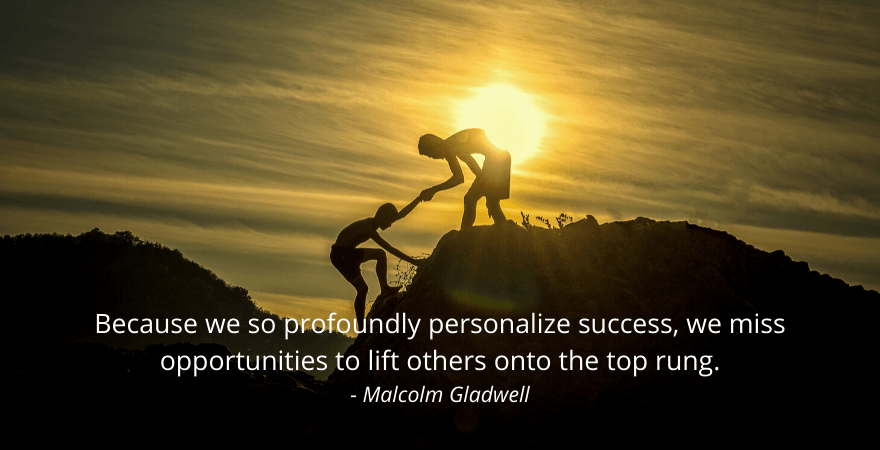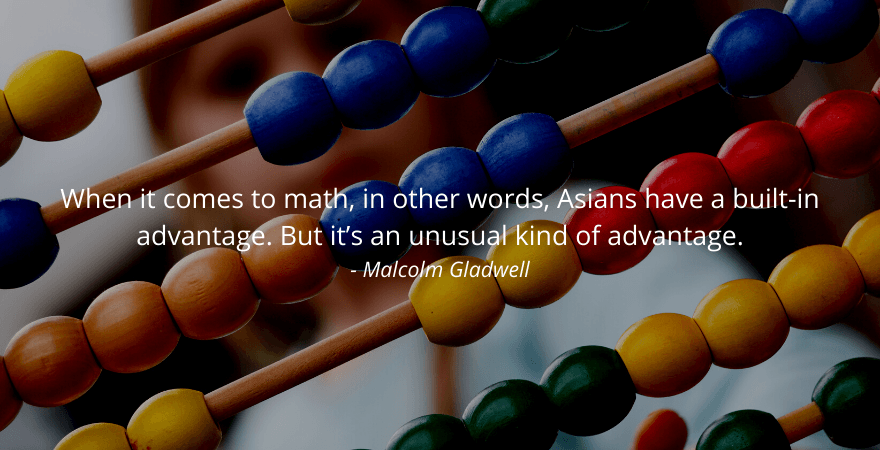Outliers is a book all about individuals who do things that go beyond the realm of the ordinary. From programmers to business tycoons, geniuses to rock stars, Malcolm Gladwell uncovers the secrets that separate the best from the rest. However, he also argues that the way we approach the concept of success is profoundly wrong.
Post Contents



What Is Outliers About?

We often attribute success to personal attributes, believing that successful individuals rose from nothing to greatness. Yet, Gladwell believes this is an over-romanticized view of success. He argues that most successful individuals have benefited from hidden advantages and cultural legacies that encourage them to learn, work, and understand the world in a way others cannot. By grasping where successful people come from, we can begin to understand the logic of success.
→ Click Here to Launch Your Online Business with Shopify
The 10,000-Hour Rule

Psychologists have spent decades attempting to find out whether innate talent exists. However, the more they research this question, the more they realize preparation plays a big role in the formation of talent.
This finding was compounded by Psychologist K. Anders Ericsson who conducted a study at Berlin’s Academy of Music. Here, he grouped the school’s violinists into three tiers according to ability and asked each student how many hours of violin they had practiced throughout their lives. Those in the top tier had practiced a total of 10,000hours, those in the middle had practiced for 8,000 hours, and those in the bottom tier, 4,000. Ericsson then repeated the study with the academy’s pianists and arrived at the same result.
Here, one can argue that it’s how much an individual practices that counts, not how much innate talent they have. To further support this finding, Gladwell uses the example of the Beatles, who, early on in their career, landed a regular set of gigs in a series of strip clubs in Hamburg, Germany. They had to play long sets, often around the clock, to try to attract those passing by. After a year and a half, they had played a total of 270 nights. By their big break in 1964, they had performed live more than 1,200 times, significantly more than most bands play in their entire careers, thus setting themselves up for success.
The Trouble With Geniuses, Part 1

Having argued that achievement is more about opportunity than talent, Gladwell next focuses on the subject of geniuses. While having a high IQ generally indicates that you’re more likely to go onto higher education and make more money, it’s only advantageous to a point. Once you exceed a score of 120, you won’t enjoy more measurable real-world advantages than those with a score of 180. To put it shortly, intelligence has a threshold.
Consequently, once you pass the threshold of intelligence, other factors beyond intelligence start to matter more to your success. For example, once a basketballer is tall enough to join the team, they start to focus on agility, ball-handling skills, and court sense.
In addition to IQ, Gladwell uses the example of divergence tests to highlight other areas in which an individual may be “smart.” Divergence tests examine your creative, imaginative capability. They often present you with two different objects, such as a brick and a blanket, and ask you to think of as many uses for them as you can. The more examples you can come up with, the more imaginative you are. Thus, Gladwell concludes, there is more to being successful than your IQ score.
The Trouble With Geniuses, Part 2

In addition to being intellectually and imaginatively smart, to be successful, it also helps to have “practical intelligence.” This kind of intelligence allows you to read a situation correctly and to get what you want. Whereas IQ is more or less innate, you have to learn to be practically smart, and most people learn this from their families.
The Three Lessons of Joe Flom

Joe Flom is the last-living named partner of a law firm called Skadden, Arps, Slate, Meagher, and Flom. Flom grew up poor during the Great Depression but managed to get a scholarship to the elite Townsend Harris public high school and went on to study at Harvard Law School. Once he graduated, he got a job with Skadden and Arps, a once struggling law firm that eventually had nearly 2,000 attorneys and earned more than $1 billion a year.
However, Gladwell doesn’t buy into the rags-to-riches story of success that Flom appears to embody. Instead, he identifies three opportunities and hidden advantages that led to his success.
Lesson No. 1: The Importance of Being Jewish
Flom is Jewish, so once he graduated, he found it hard to get a job at any of the more respectable law firms, due to the prevalence of antisemitism during this time. Consequently, he had to take a job with Skadden and Arps, a struggling law firm taking the cases that the more established firms didn’t want. This meant a lot of litigation, corporate takeovers, and proxy fight cases that Flom ended up specializing in and that the established law firms outsourced to him to avoid doing themselves.
However, during the 1970s, there was a boom in hostile takeovers, an area Flom and Skadden and Arps were now highly specialized in, that their bigger competitors had refused to take on. This left them with a considerable advantage. Therefore, this was less about Flom triumphing over adversity, but more about what started out as adversity transforming into an opportunity.
Lesson No. 2: Demographic Luck

Genes and upbringing are not enough to secure triumph. Timing is everything. To be successful, you must be born into a time and place in which you are presented with a particular set of opportunities that set you up for greatness.
Take for example the events at the turn of the 20th century. Those born in America around 1915 would’ve graduated college when the worst of the Depression was over and would’ve been drafted into World War II at a younger age in which they didn’t have too many personal responsibilities. However, those born before 1911 would’ve graduated at the height of the Depression and would’ve been drafted while cultivating their careers and family life, causing significant disruption.
Due to the timing and the location of their birth, those born before 1911 were set up with far more insurmountable obstacles to success than those born after 1915, and they consequently found it much harder to be successful.
Lesson No. 3: The Garment Industry and Meaningful Work
Jewish immigrants, like Flom, stood apart from other immigrants who came to the U.S. in the 19th and early 20th centuries. Because Jewish people were forbidden from owning land in Europe, many had previously lived in European cities and towns and took up urban trades and professions. Seventy percent of the Eastern European Jews who immigrated through Ellis Island 30 years before the First World War came with an occupational skill. This put them at an advantage to their Irish and Italian counterparts who had previously been peasants and tenant farmers.
Consequently, there are many success stories of Jewish clothing-trade entrepreneurs during this time, who went from seemingly nothing to owning a profitable business. What’s more, the work was satisfying, as it involved autonomy, complexity, and a connection between effort and reward. Work that adheres to these criteria is considered meaningful.
Therefore, the children of these successful Jewish immigrants learned that if you work hard enough, assert yourself, and use your mind, you can shape your world to suit you. What did Joe Flom’s father do for a living? He sewed shoulder pads for women’s dresses. This set Flom up with the ability to customize his world to suit his needs and to learn the value of hard work, which ultimately led to his success.
Harlan, Kentucky

Harlan, Kentucky, was founded in 1819 by eight immigrant families from Scotland and Ireland. However, all was not peaceful, as two of the town’s founding families – the Howards and the Turners – didn’t get along. Yet, this was a pattern that was repeating itself in small towns up and down the Appalachians. The reason for this pattern of violence? A culture of honor.
Such a culture arises when an individual’s reputation is central to their livelihood and sense of self-worth. Working as a herdsman would fit such a description. The Scottish-Irish immigrants that inhabited Appalachia had a particularly strong culture of honor, as they had been herdsmen who’d carved out a livelihood on rocky, inhospitable land. Consequently, they dealt with conflict by forming tight familial bonds and placing loyalty to their kin above all else.
This partly explains why murder rates are higher in the southern U.S. than anywhere else, but softer crimes such as muggings are lower. Cultural legacies persist, generation after generation. Your cultural history greatly influences your present behavior, which is a key factor in your chances of success.
The Ethnic Theory of Plane Crashes

Between 1988 and 1998, American Airlines reported only one plane accident in every 4 million flights. In comparison, during this same time period, Korean Air lost nearly five planes per million flights. Gladwell argues that the reason for Korean Air’s spate of crashes was Korea’s cultural legacy.
While each individual has their own unique personality, the community they grow up in can have a large influence on how they behave. Dutch Psychologist Geert Hofstede was fascinated by the cultural behavioral variations between countries. Keen to understand which cultures valued and respected authority and which didn’t, he created the Powder Distance Index (PDI for short).
This was of particular interest to the aviation industry because a vast amount of plane crashes occur when the co-pilot is too timid to point out faults to the pilot who is their superior. Concurrently, encouraging the co-pilots who come from high PDI countries (e.g., Korea) to assert themselves proved to be much harder than encouraging those from lower PDI countries (e.g., the U.S.), but it proved to be essential.
In 2000, David Greenberg from Delta Air Lines was brought in to transform the flailing Korean Air. The first thing he did to combat the timidity of the co-pilot towards their superior was to make English the standardized language in the cockpit. This provided the pilots with a new form of identity in which the high Korean PDI norms could be circumvented, allowing the co-pilots to become more assertive. Able to overcome the norms of their culture of deference, Korean Air hasn’t had a crash since 1999. Consequently, awareness should be brought to cultural legacies as they dictate behavior and, thus, the chances of success.
Rice Paddies and Math Tests

When English speakers are asked to look at a list of seven individual digits then look away and memorize them for 20 seconds, their recall is about 50 percent accurate. However, Chinese speakers’ recall is 100 percent accurate. The reason? We memorize easily what can be said or read within a two-second timeframe. When Chinese speakers see a seven-digit list, their language allows them to fit all the digits into a two-second span, unlike English speakers.
Further, the English-speaking number system is highly irregular. For example, numbers above 20 put the “decade” first and the unit number second, e.g., 21, but for numbers below 20, it’s the other way around, e.g., 14. This isn’t the case in China, Japan, and Korea. Their number system is more logical. For example, 11 is ten-one, and 24 is two-tens-four.
Consequently, Asian children learn to count much faster than American children. It also means they can perform more complex mathematical tasks at a younger age. Gladwell argues that because Asian children have the advantage of a logical number system, it’s more likely that they will enjoy math than their American counterparts. Consequently, they are more likely to put in the effort to learn math, so the stereotype of Asians being good at math comes from the logic of their language, not a natural innate ability.



KIPP and Taking Cultural Legacies Seriously

The KIPP Academy is in one of the poorest neighborhoods in New York City. It has large classes, no entrance requirements, and the students are chosen by lottery. Roughly half the students are African American, and the other half are Hispanic. Seventy-five percent of them are from single-parent families, and 90 percent qualify for “free or reduced lunch.” Yet, it’s one of the most desirable public schools in the city.
However, Gladwell argues that KIPP’s success isn’t due to the curriculum, teachers, or resources. It’s due to the fact that KIPP takes cultural legacies seriously. In America, it’s traditional for schools to have a long summer vacation, but this inadvertently affects the learning development of more disadvantaged kids. Sociologist Karl Alexander asked Baltimore students from first to fourth grades across low, middle, and high socioeconomic backgrounds to take a math- and reading-skills test before and after the summer holiday.
He found that while the wealthiest students significantly advanced their test scores, the poorer kids regressed, thus starting their year at a disadvantage. This is because wealthier students are more likely to be exposed to learning stimuli during the summer break, whereas the poorer kids aren’t, putting them at a disadvantage. Consequently, it’s not the schooling system that’s failing poorer kids, it’s that there isn’t enough of it for them.
KIPP has used this knowledge to restructure the way it operates. The average school day lasts from 7:25 a.m. until 5 p.m. That’s 50 to 60 percent longer than the average American public school. Then, there are homework clubs and extracurricular activities. The students come in for half-days on Saturday and they work an extra three weeks of school in July. As a result, 90 percent of KIPP students get scholarships to private or parochial high schools, and 80 percent of those will go on to college.
Ultimately, Gladwell argues, success isn’t simply the result of intelligence or isolated efforts.
Outliers are those who have been presented with an opportunity and have had the strength of mind to seize it. For the Beatles, it was their gigs in Hamburg; for Joe Flom, it was being born at the right time, to the right parents, with the right ethnicity. Likewise, for Korean Air, it was being offered the opportunity to negate the constraints of a cultural legacy. Thus, to build a better world, we should replace these arbitrary advantages that determine success for a few with a society that offers opportunities for all.
You can buy Outliers by Malcolm Gladwell on Amazon.



